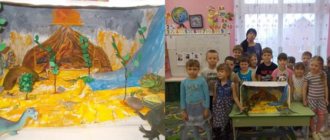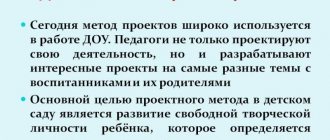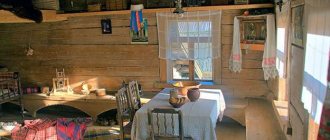Stages
The creation of a project takes place in 5 stages:
- Design. The teacher formulates the problem and indicates the goal of the project. Introduces the children into a game situation, then formulates tasks.
- Planning. At this stage, the teacher helps children plan their activities to solve the task.
- Search for information. The teacher helps children find the necessary information to solve the problem. Conducts classes and observations. The teacher can work with parents on the issue of encouraging independent creative activity in children.
- Presentation. The teacher, together with the children, prepares a presentation on the implementation of the project, after which they present it to other teachers and parents.
- Portfolio. The teacher can collect in a folder everything that was needed for the project: plan, drawings, diagrams, photographs, reports and results.
Speech therapy group
Pedagogically well-thought-out projects in preschool educational institutions are of great importance, especially in the speech therapy group. Children with speech problems need constant correction and development of speech functions. If the work is organized correctly, it will help the child develop his speech.
Sample Project
Topic: Onions are not only useful, but also interesting.
Target.
Develop the ability to find information, compose reports, newspapers.
Tasks.
Expand children's understanding of onions: varieties of onions, where onions grow. Develop in the child the ability to prepare a message on this topic. Increase parents' interest in the child's activities.
Expected results.
Making a newspaper about onions together with parents. The feeling of pleasure from children working with parents and teachers.
Project participants.
Children, parents, teacher, music director.
Conditions for the implementation of the project.
Prepare seedlings and equipment for working in the garden. Watch the film "Chippolino" with your children. Add literature on the topic to the book corner... Give recommendations to parents to purchase books with riddles and proverbs about vegetables.
Self-education.
Observations and experiments in kindergarten, studying finger games for the development of fine motor skills, studying methodological recommendations.
Event plan
1. Exhibition of children on the topic “Work in the garden.”
Selection of information materials: postcards, newspaper clippings, fiction, riddles, educational games.
2. Seedlings.
We sow onions together with parents, children and teachers.
3. Children of the senior group show a skit based on the fairy tale “Chippolino” to the children of the middle group.
4. Speech by a nurse on the topic “The invaluable benefits of onions.”
5. Children's choice of message topic. Joint development of a message plan.
6. Work on the topic of the message according to plan.
7. Summing up.
Children together with their parents design a newspaper on the topic “Onion”.
8. Presentation of the newspaper.
9. Exhibition of newspapers, tasting of salads.
10. Thematic musical break. Graduations.
What is project activity?
The essence of project activity is that the teacher creates his own project that solves a research problem. Introduces this project into work with children. In this way, children engage in search activities.
If you simply explain some material to children, there is a risk that this material will soon be forgotten. But if the children themselves looked for ways to solve a problem, using mental processes, then these thoughts will be their own.
Project activity in kindergarten is a joint play or creative activity. It develops independence, responsibility, initiative, and determination.










